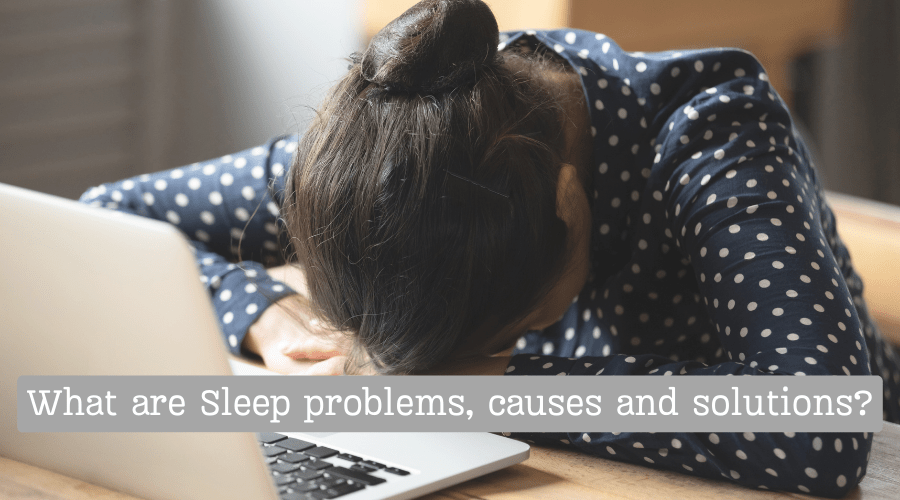Many people struggle to sleep these days due to the pace of life. The number of persons experiencing insomnia is rising. This harms their emotional and physical well-being. Not getting enough or good sleep can disrupt mental and emotional health as well as fatigue.
Knowing what causes sleep issues and how to remedy them becomes more crucial as we learn more. Modern stress and poor sleep habits can disrupt the body’s natural cycle. These issues require lifestyle modifications and careful measures.
We’ll discuss the cause and sleep problem solution. Sleep+ may help you sleep. We explore the worlds of sleep to find answers, comprehension, and renewal.
What’s Sleep Problem?
A sleep problem comprises chronic problems starting or maintaining a restful sleep cycle in addition to occasional restlessness. The main indication is insomnia, which might manifest as fighting to fall asleep or waking up early or frequently. The repercussions go beyond sleepiness and touch many areas of life. Understanding that sleep difficulties have numerous causes is the first step to discovering solutions that will improve your sleep and mood.
Sleep Problem Causes
Sleep benefits our mental and physical wellness. To solve this widespread problem, you must identify sleep disorders, which often involve lifestyle, mental health, and outside factors. Here we discuss sleep problem causes:
Stress & Anxiety
One of the main causes of insomnia is chronic stress and worry. Stressful situations and ordinary living might disrupt sleep. Chronic anxiety, worry, and stress can disrupt the sleep-wake cycle. Stress can limit melatonin production by releasing cortisol. People with this imbalance have problems falling or staying asleep, which increases tension and makes sleep harder.
Poor Sleep
Many people have problems sleeping due to poor sleep habits, or “poor sleep hygiene.” Changing your bedtime and waking time might disrupt your body’s internal clock, making it hard to keep to a sleep regimen. Overusing devices before bed exposes people to stimulating blue light and reduces melatonin production, delaying sleep. A terrible mattress or pillow can also make you feel lousy and agitated at night, making it hard to sleep.
Diseases and conditions
Physical issues might also disrupt sleep. Chronic pain, like arthritis or back difficulties, might make it hard to find a comfortable sleeping posture and enjoy a decent night’s sleep. Sleep apnea can make it hard to breathe while sleeping, waking you up repeatedly. Hormonal imbalances, especially thyroid issues, can alter sleep patterns, worsening insomnia.
Prescribed drugs
Drugs and pharmaceuticals can disrupt your sleep-wake cycle, worsening or causing sleep issues. Caffeine and nicotine in coffee, tea, and cigarettes might make it hard to sleep. If you take these medications before bed, you may feel alert and have problems sleeping. Abusing sleep aids, even legal ones, can cause dependence and worsen sleep disorders.
Infographic
Sleep Problem Solution
There is no universal sleep solution. It requires lifestyle changes and targeted interventions. We’ll discuss sleep problem solution:
Schedule regular sleep
Sleeping regularly is one of the best ways to address sleep issues. For proper rest and recovery, sleep seven to nine hours per night. Consistency strengthens the body’s internal clock and improves sleep-wake cycles.
Going to bed and waking up at the same time every day helps your body adjust. It’s easier to fall asleep and wake up independently. Patterns regulate melatonin production, which signals sleep.
Limit screen time before bed
In our digital age, limiting screen time before bed is crucial for sleep. Smartphones and computers emit blue light that disrupts melatonin production. It may be tougher to fall asleep.
At least one hour before bed, disconnect from technology. This improves sleep. Reading a book, taking a warm bath, or stretching gently will help your body relax.
Relaxation techniques
Adding relaxing practices to your nightly routine can improve sleep. Stress and worry can make it hard to sleep, but progressive muscle relaxation, deep breathing, and meditation can help.
When you do them, your neurological system knows to relax from the day’s tension. This adjustment prepares your body for uninterrupted sleep.
Consider natural supplements
Herbal sleep supplements like Rasayanam Sleep+ can assist you in sleeping beyond lifestyle changes. These pills include carefully selected calming components. They aim to help you sleep without becoming dependent on them like other sleep aids.
Natural products can gently change your sleep pattern to make it more consistent and healthier. Before adding any new vitamins to your routine, see a doctor or nurse to ensure they’ll meet your needs.
Make your bedroom sleep-friendly
Creating a sleep oasis in your bedroom is crucial to optimal sleep. Avoid waking up by keeping the room chilly, dark, and quiet. Choose a comfortable mattress and pillows that support your body.
Ensuring your bedroom is soothing teaches your brain to relax. A peaceful bedroom can help you create a mind-body space for deep, undisturbed sleep.
Conclusion
Worry, anxiety, lifestyle choices, and underlying health disorders can exacerbate sleep issues. To discover the optimal solution, people often look at the problem from all perspectives and combine focused interventions with lifestyle adjustments. Good sleep habits are crucial, but natural products like Rasayanam Sleep+ may help you sleep well and recharge. It’s crucial to obtain adequate sleep for your physical and mental well-being, not merely as a luxury.

As the editor of the blog, She curate insightful content that sparks curiosity and fosters learning. With a passion for storytelling and a keen eye for detail, she strive to bring diverse perspectives and engaging narratives to readers, ensuring every piece informs, inspires, and enriches.











